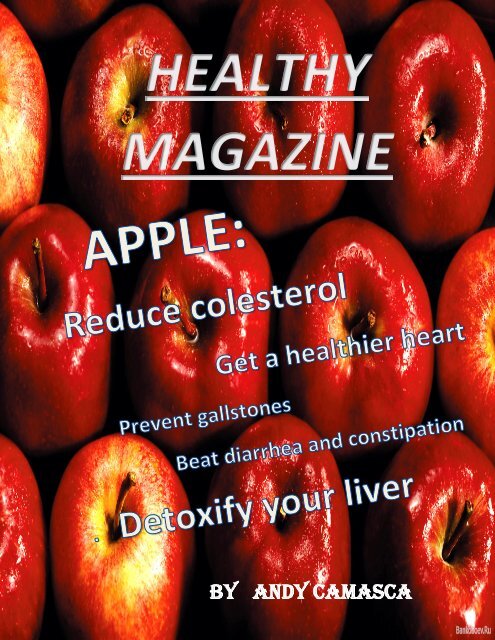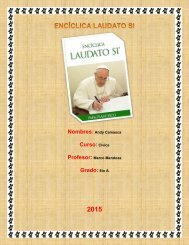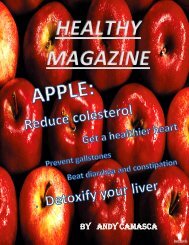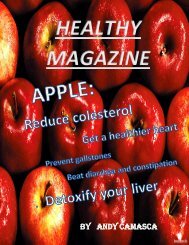magazine apple
- No tags were found...
Create successful ePaper yourself
Turn your PDF publications into a flip-book with our unique Google optimized e-Paper software.
By<br />
Andy Camasca
Antioxidants are disease-fighting compounds. Scientists believe these compounds<br />
help prevent and repair oxidation damage that happens during normal cell activity.<br />
Apples are also full of a fibre called pectin—a medium-sized <strong>apple</strong> contains about<br />
4 grams of fibre. Pectin is classed as a soluble, fermentable and viscous fibre, a<br />
combination that gives it a huge list of health benefits.<br />
An <strong>apple</strong> won’t replace your toothbrush, but biting and chewing an <strong>apple</strong> stimulates<br />
the production of saliva in your mouth, reducing tooth decay by lowering the levels<br />
of bacteria.<br />
A new study performed on mice shows that drinking <strong>apple</strong> juice could keep<br />
Alzheimer’s away and fight the effects of aging on the brain. Mice in the study that<br />
were fed an <strong>apple</strong>-enhanced diet showed higher levels of the neurotransmitter<br />
acetylcholine and did better in maze tests than those on a regular diet.<br />
Research has shown that people who eat fruits<br />
and other high-fibre foods gain a certain amount of<br />
protection against Parkinson’s, a disease<br />
characterized by a breakdown of the brain’s<br />
dopamine-producing nerve cells. Scientists have<br />
linked this to the free radical-fighting power of the<br />
antioxidants contained therein.<br />
Scientists from the American Association for<br />
Cancer Research, among others, agree that the<br />
consumption of flavonol-rich <strong>apple</strong>s could help reduce your risk of developing<br />
pancreatic cancer by up to 23 per cent. Researchers at Cornell University have<br />
identified several compounds—triterpenoids—in <strong>apple</strong> peel that have potent antigrowth<br />
activities against cancer cells in the liver, colon and breast. Their earlier<br />
research found that extracts from whole <strong>apple</strong>s can reduce the number and size of<br />
mammary tumours in rats. Meanwhile, the National Cancer Institute in the U.S. has<br />
recommended a high fibre intake to reduce the risk of colorectal cancer.
Women who eat at least one <strong>apple</strong> a day are 28 percent less likely to develop type<br />
2 diabetes than those who don’t eat <strong>apple</strong>s. Apples are loaded with soluble fibre,<br />
the key to blunting blood sugar swings.<br />
The soluble fibre found in <strong>apple</strong>s binds with fats in the intestine, which translates<br />
into lower cholesterol levels and a healthier you.<br />
An extensive body of research has linked high soluble fibre intake with a slower<br />
buildup of cholesterol-rich plaque in your arteries. The phenolic compound found in<br />
<strong>apple</strong> skins also prevents the cholesterol that gets into your system from solidifying<br />
on your artery walls. When plaque builds<br />
inside your arteries, it reduces blood flow to<br />
your heart, leading to coronary artery<br />
disease.<br />
Gallstones form when there’s too much<br />
cholesterol in your bile for it to remain as a<br />
liquid, so it solidifies. They are particularly<br />
prevalent in the obese. To prevent<br />
gallstones, doctors recommend a diet high<br />
in fibre to help you control your weight and<br />
cholesterol levels.<br />
Whether you can’t go to the bathroom or<br />
you just can’t stop, fibre found in <strong>apple</strong>s can help. Fibre can either pull water out of<br />
your colon to keep things moving along when you’re backed up, or absorb excess<br />
water from your stool to slow your bowels down.<br />
Irritable bowel syndrome is characterized by constipation, diarrhea, and abdominal<br />
pain and bloating. To control these symptoms doctors recommend staying away<br />
from dairy and fatty foods while including a high intake of fibre in your diet.
"Most <strong>apple</strong>s will have pesticides on them, unless they are certified<br />
organic," Flores said. Results analyzed by the Environmental Working<br />
Group showed that 98 percent of conventional <strong>apple</strong>s had pesticide<br />
residue on their peels. The group also said in its report, however, that<br />
"the health benefits of a diet rich in<br />
fruits and vegetables outweigh the risks<br />
of pesticide exposure.<br />
Apple seeds, also called pips, contain a<br />
substance called amygdalin, which can<br />
release cyanide, a powerful poison, when it comes into contact with<br />
digestive enzymes. Whole seeds will pass through your digestive<br />
system relatively untouched, but if you chew the seeds you may be<br />
exposed to the toxins. One or two will not be harmful, as the body can<br />
handle small doses of cyanide, but if you or a child chews and<br />
swallows a lot of seeds, you should seek medical attention<br />
immediately. A very large helping of <strong>apple</strong> seeds may be fatal.
http://www.ionizeroasis.com/benefits-of-<strong>apple</strong>s/<br />
http://www.besthealthmag.ca/best-eats/nutrition/15-health-benefits-of-eating<strong>apple</strong>s#eVzyyvmoGRuJTdqJ.97<br />
http://www.livestrong.com/article/548980-advantages-disadvantages-of-eating-<strong>apple</strong>severy-day/<br />
http://www.livescience.com/44686-<strong>apple</strong>-nutrition-facts.html<br />
http://www.eatingwell.com/nutrition_health/nutrition_news_information/5_health_benefits_<br />
of_an_<strong>apple</strong><br />
http://www.wikihow.com/Eat-an-Apple







